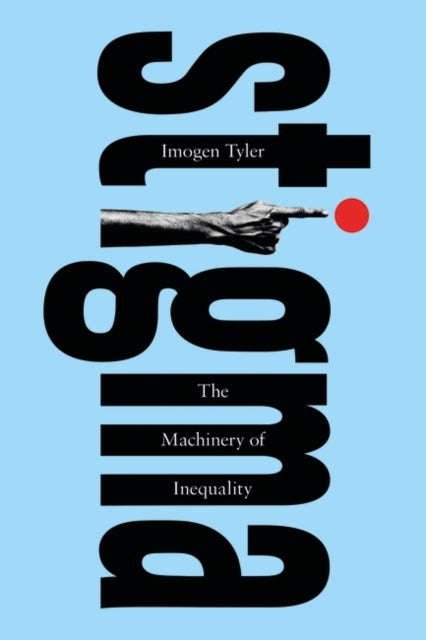ImogenTyler
Stigma: The Machinery of Inequality
Stigma: The Machinery of Inequality
YOU SAVE £1.20
- Condition: Brand new
- UK Delivery times: Usually arrives within 2 - 3 working days
- UK Shipping: Fee starts at £2.39. Subject to product weight & dimension
Bulk ordering. Want 15 or more copies? Get a personalised quote and bigger discounts. Learn more about bulk orders.
Couldn't load pickup availability
- More about Stigma: The Machinery of Inequality
Stigma is a powerful social force that has been used to dehumanize, scapegoat, and oppress individuals and communities throughout history. Tyler's book explores how stigma has been used as an instrument of state coercion, revealing previously forgotten histories of resistance against stigmatization. These histories provide insights into the rise of authoritarian forms of government today.
Format: Paperback / softback
Length: 384 pages
Publication date: 21 October 2021
Publisher: Bloomsbury Publishing PLC
Stigma is a potent social force that has dehumanized, scapegoated, and oppressed individuals and communities throughout history. It has been employed as a tool to secure the interests of powerful elites, from the literal stigmatization of criminals in ancient Greece to modern-day discrimination against Muslims, refugees, and the undeserving poor. In his groundbreaking book, Tyler offers a radical reconceptualization of stigma, presenting it as an instrument of state coercion. Through an original social and economic lens, Tyler uncovers stigma as a political practice, illuminating previously forgotten histories of resistance against stigmatization. He boldly argues that these histories offer invaluable insights into the rise of authoritarian forms of government today.
Stigma has a long and complex history, dating back to ancient times. In ancient Greece, criminals were often tattooed as a form of stigma, marking them as outcasts and undesirables. This practice continued in various forms throughout history, including during the **** regime in Germany, where Jews were forced to wear yellow stars.
In modern society, stigma is often associated with certain groups, such as Muslims, refugees, and the poor. These groups are often subjected to discrimination, marginalization, and violence, leading to social exclusion and economic inequality. Stigma can have devastating consequences for individuals and communities, including mental health problems, poverty, and social isolation.
One of the key arguments made by Tyler in his book is that stigma is not just a social phenomenon, but also a political one. He argues that stigma is used by governments and other powerful institutions to maintain control over their populations and to justify their actions. For example, during the Cold War, the United States government used anti-communist stigma to justify its policies of containment and intervention in other countries.
Tyler also offers a critical analysis of the ways in which stigma is perpetuated in modern society. He argues that stigma is often reinforced by media, popular culture, and political discourse. For example, the media often portrays Muslims as terrorists, refugees as threats, and the poor as lazy and irresponsible. This portrayal contributes to the perpetuation of stigma and reinforces social divisions.
In addition to his analysis of the political function of stigma, Tyler also offers insights into the ways in which individuals and communities can resist stigma. He argues that resistance can take many forms, including social activism, education, and cultural change. For example, individuals and communities can challenge stereotypes and promote positive representations of marginalized groups. They can also work to create spaces where individuals can feel safe and supported, particularly those who are marginalized by stigma.
Overall, Tyler's book is a powerful and thought-provoking exploration of the political function of stigma. It offers valuable insights into the ways in which stigma has dehumanized and oppressed individuals and communities throughout history and provides a roadmap for resistance and social change. By challenging the dominant narratives that perpetuate stigma, we can work towards a more just and equitable society.
Weight: 588g
Dimension: 284 x 157 x 22 (mm)
ISBN-13: 9781786993298
This item can be found in:
UK and International shipping information
UK and International shipping information
UK Delivery and returns information:
- Delivery within 2 - 3 days when ordering in the UK.
- Shipping fee for UK customers from £2.39. Fully tracked shipping service available.
- Returns policy: Return within 30 days of receipt for full refund.
International deliveries:
Shulph Ink now ships to Australia, Belgium, Canada, France, Germany, Ireland, Italy, India, Luxembourg Saudi Arabia, Singapore, Spain, Netherlands, New Zealand, United Arab Emirates, United States of America.
- Delivery times: within 5 - 10 days for international orders.
- Shipping fee: charges vary for overseas orders. Only tracked services are available for most international orders. Some countries have untracked shipping options.
- Customs charges: If ordering to addresses outside the United Kingdom, you may or may not incur additional customs and duties fees during local delivery.


